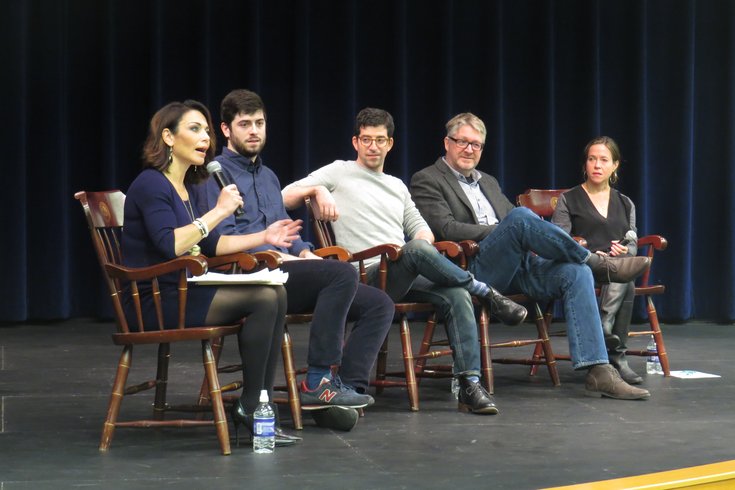
November 18, 2015
 John Kopp/PhillyVoice
John Kopp/PhillyVoice
The Daily Show producer Stuart Miller, middle, told media arts students at Germantown Academy on Wednesday that finding one's place within the film industry takes patience. Also pictured, left to right, are moderator Erin O'Hearn and producers Tim McAleer, Paul Mezey and Susannah Ludwig.
Stuart Miller found himself back at Germantown Academy on Wednesday, describing his journey from a typical high school student to an Emmy Award-winning producer of The Daily Show.
Miller, who graduated from Germantown Academy 25 years ago, told a group of media arts students that finding one's place within the film industry can take time. For Miller, it took the duration of his 20s. After dabbling in scripted development, Miller first found a home at CBS, where he served as an associate producer for the newsmagazine 48 Hours.
"I really enjoyed the news," Miller said during a panel discussion featuring three other producers. "I liked the immediacy of it and the fact that you would film something and it would air. That would be it and you would move on, where film can take a long time."
But Miller also enjoyed entertainment. So he jumped at a chance to join The Daily Show, where he has produced more than 500 episodes working alongside comedians Jon Stewart and now Trever Noah.
"There are so many jobs, and it's such a big field that finding a place in it is what takes a bit of time and a bit of doing," Miller said. "When you do settle, you'll be happy."
Miller was joined on the panel by Paul Mezey, an Academy Award-nominated producer for Maria Full of Grace and Beasts of the Southern Wild; Susannah Ludwig, producer of the Academy Award-nominated short documentary Kings Point; and Tim McAleer, a 2009 Germantown Academy graduate who works for Ken Burns' production company.
"This panel lineup you would see at Philly International Film Festival or you would see at Film New York or at Sundance," said Gabrielle Russomagno, head of GA's Visual Arts Department. "All of them, that's where they would be. To have them at the high school for these kids to feel inspired by and find something aspirational in their life stories was really important for us to do."
Many of the students, which included a handful from The Haverford School and Penn Charter, are producing short films for Film Now, a new international high school film festival going live Dec. 15. Following the panel discussion, the producers led a series of breakout sessions focusing more closely on a variety of filmmaking skills.
Somewhat surprisingly, none of the students asked Miller about working alongside Stewart, who left The Daily Show in early August after a 16-year run that made satirical newscasts wildly popular and, in the view of some, more credible than actual TV news.
"Jon created the forum," Miller said in an interview afterward. "He literally created what this side of the business is. Trevor — a lot of people forget he was at The Daily Show for a while — is an apt student of Jon's. The show itself works so well behind the scenes that we've kept running, kept churning. We have such processes in place ... that we just keep chugging along."
Miller has played a large role in that. He is responsible for producing many of the pre-recorded segments that air during The Daily Show, a role he described in detail to the students.
"Waiting for that divine intervention for the amazing joke that's going to come — yeah, you do get some days like that," Miller said. "But there are a lot of days where you are just not feeling it. Those are the days that you really have to write. That's where you, well, keep your job. ... Those are the days that you get better as a writer, when the idea may not be as great."
The other producers echoed Miller's message, encouraging the students to follow their interests, but also to be mindful of their skills. Many of them initially expected their film careers to follow a different avenue.
Ludwig knew she wanted to depict true stories, but it took her years to realize that producing was her best fit.
"I'm not really good, myself, at coming up with shots or coming up with a story out of nowhere," Ludwig said. "My brain doesn't really work like that. ... It began to get clearer and clearer as I got older that, in some ways, figuring out what you're meant to do in life is about what feels natural to you and then learning as much as you can to be as good at it as you can."
Likewise, Mezey initially sought to be a director until he recognized he was not a very strong writer. In collaborating on a short film, Mezey realized that storytelling was not the sole responsibility of the director. Rather, it's the collaboration of everyone involved with the film.
"That freed me up to contribute what I could do well and feel complete ownership of what I was creating," Mezey said. "To me, that was a real seminal moment."